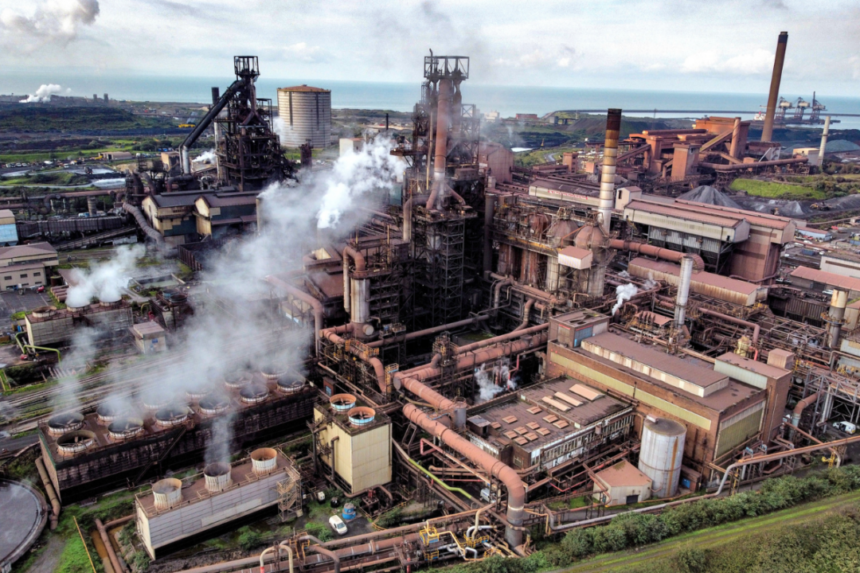Approximately 2,800 job losses are still anticipated at Port Talbot, with GMB union leader Gary Smith emphasizing the need for the UK to halt decarbonisation through de-industrialisation.
A deal has been struck between the government and Tata Steel to safeguard some jobs as the Port Talbot plant transitions to a low-carbon steel production system.
Agreed upon by Tata Steel’s Chairman Natarajan Chandrasekaran, Prime Minister Sir Keir Starmer, and senior Cabinet members, the deal includes a minimum compulsory redundancy payout of £15,000, a £5,000 retention payment, and opportunities for paid-for training.
Business and Trade Secretary Jonathan Reynolds stated, “Port Talbot has always been and will always be a steelmaking town. This deal achieves what previous agreements could not—providing optimism for the future of steelmaking in South Wales.”
Reynolds further commented, “We recognize that a cleaner, greener future for UK steelmaking is crucial for the industry’s sustainable economic growth. While challenges lie ahead, our steel strategy will outline a positive outlook for the industry, supported by our commitment of £3 billion in government investment.”
Earlier this year, Tata Steel, an Indian steel conglomerate, announced a decarbonisation plan for the Welsh plant, involving the closure of its two blast furnaces and the transition to an electric arc furnace (EAF) system for steel production from recycled steel and iron scraps.
Once Port Talbot’s second blast furnace is shut down by the end of this month, the UK will become the sole developed nation unable to manufacture steel from scratch.
Anticipated Redundancies
Despite efforts to preserve approximately 5,000 jobs nationwide, approximately 2,800 individuals are expected to lose their positions at the plant following the closure of the final blast furnace, as the electric arc system will require fewer workers and take years to construct.
The government has outlined a minimum compulsory redundancy package of £15,000 to support the Port Talbot community, along with a voluntary redundancy scheme offering 2.8 weeks’ earnings per year of service, up to a maximum of 25 years, for employees opting for redundancy.
Tata Steel has committed to providing a comprehensive training program for those at risk of compulsory redundancy, with employees receiving full pay for the first month and £27,000 per annum for the subsequent 11 months during training.
The steel company has projected the creation of at least 500 new jobs to facilitate the construction of the EAF, slated to be operational within three years.
“We eagerly await the swift and effective implementation of the EAF project. We remain committed to collaborating with the Transition Board and the UK and Welsh governments to leverage this project as a driver for economic revitalization and job creation in South Wales,” Narendran expressed.
De-Industrialisation for Net Zero
While trade unions have endorsed this agreement, not all leaders are content with the impact of the net zero trajectory on British industry.
Gary Smith, GMB union leader, cautioned that the upcoming weeks will be challenging as thousands face job losses.
Smith acknowledged that while Labour has adopted several union proposals, the ramifications for the Port Talbot community and the industry will be significant.
“We are witnessing a decline in steel production capacity,” Smith conveyed to BBC News.
He continued, “Numerous jobs will be lost, communities will be devastated. While the UK will reduce its emissions significantly, at what cost?”
“We must halt the decarbonisation process through de-industrialisation. Dismissing working-class individuals, hollowing out communities, is not the solution for achieving decarbonisation in the country,” he emphasized.
The GMB leader highlighted the ongoing need for “ample steel” in the UK, cautioning that the country may resort to importing from coal-dependent nations like China.
“This approach poses risks to national security and contradicts environmental objectives,” he pointed out.
“While there is talk of transitioning to net zero, wind farms off the UK coast are predominantly constructed in China and Indonesia, not utilizing UK resources,” Smith remarked.
He advocated for a transparent discussion on how environmental policies are impacting employment, stating, “It’s resulting in job losses.”
Please rewrite the content.
Source link








